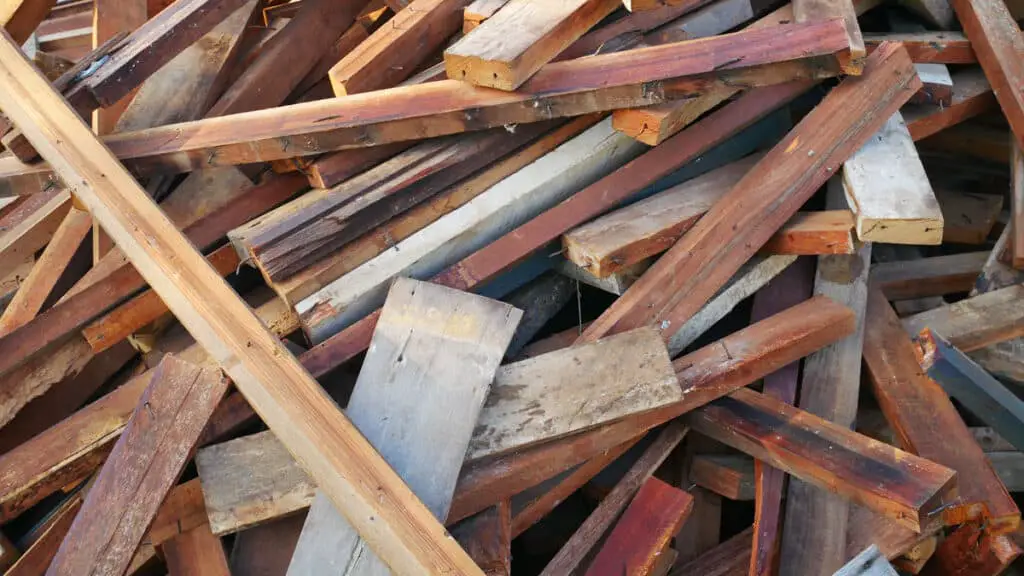Wood is a natural material, and one that we should certainly be re-using wherever possible and failing that, recycling to give it a future life with a new use. That’s all well and good, but what how should you dispose of it in the most environmentally friendly and sustainable way?
Contents
General Waste Bin Vs Recycling
Wood should go into your general waste bin if you need to use a kerbside recycling service. A better option is to take it to the tip and place it into the wood skip. The exception to the rule is small branches, hedge cuttings and twigs if you have a garden waste collection available.

Rubbish that goes into general waste gets treated differently depending on where you live in the UK. The general goal of council run waste collections is to reuse and recycle as much as possible, with much of the remainder going for incineration (often referred to as waste to energy) and what’s left ending up in landfill.
Burning Waste Wood
Burning rubbish in your garden is not illegal, but not advisable either. While the law does not prevent bonfires in themselves, it does prevent you from causing a smoke nuisance to your neighbours. What’s more, if everyone starts to burn waste this way, there will be significantly more environmental damage that if it’s dealt with collectively by the local authority at specially built locations like Energy Recovery Facilities (ERF).
It is not a good idea to burn wood and other rubbish in your garden, because you can create a nuisance for your neighbours with smoke that could be considered against the law. Bonfires also reduce air quality, and many built up areas (particularly in cities) have additional restrictions.
We have more information about burning rubbish in your garden here.
Burning Furniture Can Be Illegal
Some people are under the impression that they can burn old and unwanted furniture because they mistakenly believe it’s ‘just wood’.
Almost all types of wooden furniture is treated in some way, perhaps to provide strength, but more likely to give a great and appealing aesthetic finish.
Burning furniture is illegal because the wood and other materials are likely to be treated in some way that produce toxic fumes when burnt, or create unnecessary pollution. If you illegally burn waste, you can be fined up to a maximum of £50,000.
Old Wooden Furniture
If you’ve got old furniture that’s now surplus to requirements, there are a number of great ways to get rid, so you don’t need to even think about burning it. Just because you can’t put it into your garden waste bin (if you have one), doesn’t mean it can’t be recycled.
Most local authorities have a number of Household Waste Recycling Centres (HWRCs) that you can take household rubbish to, and typically one of the services they off is wood recycling. As a specific service, they will be able to handle treated wood, allowing it to be broken down for recycling, or better still, re-used.
Another option if your furniture is still in reasonable condition but no longer needed is to donate it to charity. That is probably the best outcome because it removes the need for recycling at all, saves someone else from buying new furniture and helps to raise money for a good cause, all in one go.
We’ve got a whole page discussing disposing of unwanted furniture here.
Wooden Pallets
Wooden pallets are used extensively in the logistics industry, forming a base for products to be transported in bulk on lorries. Generally, for this reason, they’re trade waste and cannot go into your households waste bins for collection.
Wooden pallets are usually considered to be trade waste, so if you’re a business you can have them collected for a fee by waste management companies. Individual pallets may be accepted at your local HWRC to be placed in a wood skip if it’s genuinely residential waste, but should not go into your wheelie bin.
If pallets are placed into general waste, they may not get recycled as efficiently as they would from your nearest council tip. As a result they could end up being incinerated.
Kitchen Cabinets
Replacing your kitchen is usually a major project for homeowners, even if the work is completely done by an installation company. It’s a big decision to get right because you’re unlikely to replace the kitchen again for at least a decade and probably much longer.
Disposing of old kitchen cabinets is usually done by the installation company taking them away for recycling. If you self install your new kitchen, you can take the old units to the local tip for disposal, usually in the wood bin.
Uses For Recycled Wood
Wood is an incredible versatile material, used extensively in the construction industry and by furniture manufacturers. It’s important that when items reach the end of their useful lives in a home, they’re disposed of responsibly.
In some cases, donating items to charities and other good causes is possible, and re-use is better than recycling. Where they are genuinely no longer of use, almost all wood can be reused in one form or another.
Recycled wood is also referred to as reclaimed wood. It has a variety of uses, including being used to create new furniture. It also has a role to play in flooring surfaces and the construction industry. Using recycled wood reduces the demand for deforestation.
Re-use and recycling of wood means that less trees are cut down. That means more trees are still working to reduce the carbon in the atmosphere and ultimately good recycling practices slow the onset of climate change. While in isolation they’re unlikely to put climate change into reverse, it’s a good and easy single contribution to minimising human effects on the environment.
